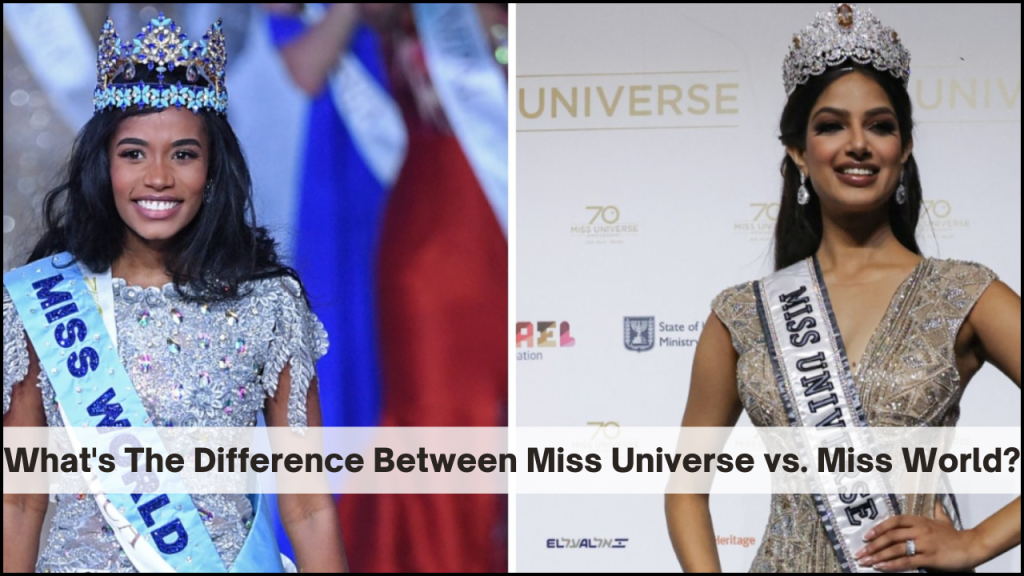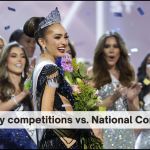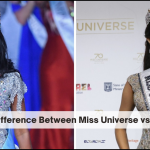
Beauty pageants have long been a symbol of grace, intelligence, and cultural representation, with Miss Universe and Miss World being the two most prestigious global competitions. While both aim to celebrate beauty with a purpose, they differ significantly in their history, judging criteria, advocacy focus, and overall structure. Understanding these distinctions can help pageant lovers, aspirants, and viewers appreciate the uniqueness of each competition.
Table of Contents
Origins and History
- Miss World: Established in 1951 by Eric Morley in the United Kingdom, Miss World is the oldest surviving international beauty pageant. It started as a festival to promote swimwear but soon developed into a platform highlighting humanitarian efforts and social causes.
- Miss Universe: Founded in 1952 by Pacific Mills, a clothing company in the United States, Miss Universe has always been about celebrating women’s confidence, intelligence, and beauty. It has since grown into a global brand, focusing on empowering women and providing them with opportunities worldwide.
Judging Criteria
While both competitions assess contestants on beauty, intelligence, and personality, they have distinct evaluation processes:
- Miss World: Focuses heavily on charity. One of its defining segments is the “Beauty with a Purpose” project, where contestants present their humanitarian initiatives. Other rounds include sports challenges, talent showcases, and head-to-head interviews.
- Miss Universe: Puts a stronger focus on confidence, public speaking skills, and stage presence. The pageant includes swimsuit and evening gown rounds, along with a crucial question-and-answer session that tests intelligence, awareness, and communication skills.
Advocacy and Social Impact
- Miss World: Has a strong humanitarian focus, partnering with charities and social organizations worldwide. Winners work on long-term projects related to health, education, and poverty relief.
- Miss Universe: Advocates for women’s empowerment and leadership. Titleholders actively participate in global initiatives related to gender equality, education, and personal development.
Eligibility and Contestants
Both pageants have similar eligibility criteria, but slight variations exist:
- Miss World: Contestants must be aged between 17 and 27. They are expected to have a strong social cause initiative and a record of community service.
- Miss Universe: Participants should be aged 18 to 28, with a focus on personality, stage confidence, and articulate speaking skills.
Event Structure
- Miss World: The competition runs for over a month, featuring preliminary events like talent rounds, sports challenges, and the “Beauty with a Purpose” presentation. The finale involves a fast-track system, where winners from different segments automatically advance to the top rankings.
- Miss Universe: The pageant is more focused on the final live telecast, where contestants compete in swimsuit, evening gown, and Q&A rounds before the ultimate winner is crowned.
Crowns and Titles
- Miss World Crown: The crown has developed over the years, currently featuring an intricate blue design that symbolizes beauty and social responsibility.
- Miss Universe Crown: Several crowns have been used in the pageant’s history, with recent ones highlighting luxury and sophistication, symbolizing empowerment and success.
Notable Winners
- Miss World: Some of the most famous winners include Aishwarya Rai (1994, India), Priyanka Chopra (2000, India), and Megan Young (2013, Philippines). These women have continued their humanitarian work and excelled in entertainment and business.
- Miss Universe: Iconic winners include Sushmita Sen (1994, India), Pia Wurtzbach (2015, Philippines), and Harnaaz Sandhu (2021, India). Many Miss Universe winners go on to become actors, entrepreneurs, and supporters.
Global Reach and Popularity
- Miss World: Remains extremely popular in Europe, Asia, and Africa, focusing more on charitable work than glamour.
- Miss Universe: Has a stronger global media presence, particularly in Latin America, the USA, and the Philippines, with winners often making headlines for their advocacy and career achievements.
Final Verdict
Both Miss Universe and Miss World hold immense prestige, but their differences make them unique:
- If you’re passionate about charity work and social causes, Miss World is the ideal competition.
- If you aim for a high-profile global platform and media exposure, Miss Universe is the better choice.









